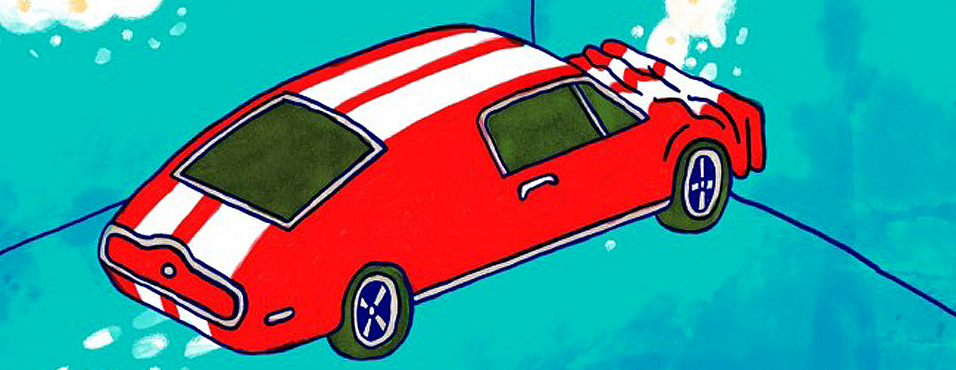After reading the title of a book of stories by Israeli writer Etgar Keret Stuck on the edge of the galaxy, the first associations willy-nilly arise with a completely different work – the cycle of the classic of the fantasy genre, Douglas Adams The Hitchhiker’s Guide to the Galaxy. After sorting through the collection, we have to conclude that this connection was not completely without foundation, although Keret, of course, writes in a completely different genre. For those who are already familiar with the author’s first collection of stories published in Latvian The bus driver who wanted to be God perhaps the writer’s style will bring less surprises, but those who will get to know these stories for the first time will want to envy the upcoming adventure.
We see and feel
If we talk about names, it should be noted that Keret’s collection has a different name in English Fly Alreadyin Latvian – the name of the story found in the second collection, translated as Do not do that (in the original It flies though). On the other hand, the Latvian title of the book cannot be found in the table of contents – it is a story created as an e-mail correspondence, Subject column component, the name of a popular entertainment escape room. But the titles of the stories, if we distinguish the table of contents before the rest of the text, form an eloquent part of the book by themselves: phrases like Rabbit on the father’s side and Car concentrate describes quite well what the stories themselves will be – absurd, fantastic, ironic and poignant.
After reading the stories, there is a desire to divide them into two categories. First of all, these are stories in which something of Adams’s eccentric, hyperbolized worldview is truly felt. A circus worker who is fired from a cannon as a reward. A father who leaves the family but (according to the children) returns in the form of a rabbit. A man who, after losing his memory, is placed in a space that simulates all physical senses, where the line between actual and virtual reality gradually disappears. A billionaire who buys other people’s birthdays. An angel bored with endless cloud gardening in a godless paradise. A woman whose gift to a beggar prompts the world’s mighty to create a works of mercy app. A man who wants to take his holocaust survivor mother to the mentioned escape room exactly on the anniversary of the tragedy, but does not really realize what he is actually listed with.
And then there are the stories we are willing to believe. A guy who wants to buy a gram of marijuana to casually meet a cute girl. A father who, after spotting a suicide bomber on the roof of a house, runs up to prevent disaster, while his young son believes that a superhero is preparing to take off on the roof and tries to encourage him. A lonely kindergarten teacher who meets an equally lonely woman on the beach every night to smoke weed at sunset. A writer whose friend asks him to write a story to help seduce girls, and who writes a story about how he writes that story. A woman who recently had an abortion visits the Holocaust Museum in Jerusalem. These stories, although the situations depicted in them are often painted with the same dark farcical gouache as the first category, depict people whose lives seem a little over-brightened as in an intentionally lit photo, but we see and feel them, because the surreal is almost not distracting.
At a confusing angle
However, such a classification of stories, upon closer inspection, reveals itself to be artificial. Because the characters who deal with such phenomena as cloning and extraterrestrial intelligence in the Vonnegut-like fantasy setting are the same ones Kerett sees walking the streets of his most frequently described city, Tel Aviv. The clothing in which the writer expresses harsh, uncomfortable and well-known truths can be borrowed from (conditionally) factual realism or reality, which, like a literary imitation of Salvador Dali’s paintings, is stretched and twisted in unexpected, confusing angles, but the truths themselves do not change from this.
They are stories about love, family, loneliness, about the historical traumas of their people (often approaching this topic with open self-irony), the search for identity and existential crises. Stories that are so unpretentious that it often seems that the author, wrapped in the smoke of his own often invoked grass, carelessly writes down a vision, in the center of which lies a thought, covering it with colorful grotesque details that emerge from consciousness. They are not pleasant visions, almost all of them crowd the dark side of existence – pain, depression, anger, injuries, hatred, lies dance undisguised there – but they are characterized by a lightness that has nothing to do with superficiality. And we can’t expect anything else from a writer who is able to preach about such topics as suicide and the Holocaust with a smile. The most imperceptible line is drawn between the comic and the tragic. Therefore, the mood of almost every story is formed by the same emotional dilemma, which is well known to fans of black humor, that is, a cocktail of laughter and horror, and with the intensity of these emotions in the reader, the writer plays filigree.
About myself, about life
Almost all the stories are expressed concisely, except for the penultimate one – Pineapple Crush; the story already mentioned escape room visit is divided into several parts scattered among other texts, so that the reader cannot be sure that he has read to the end for a relatively long time. However, it is not really possible to perceive Keret’s stories as experiments with style or form – even if (in some cases) we feel that the ending comes too abruptly, we have to consider that the author allows us to enter his world only as far as he wants with each work. However, even in a very laconic format, he is able to introduce a real concentrate of life, just as one of his characters keeps a “car concentrate” in his apartment – a flattened metal box, which, as he explains to his girlfriend’s children, will turn into a real car as soon as water is poured over it. Keret, on the other hand, pours water (besides, icy cold and – without waiting) on the reader himself almost every time in the story, but we continue to watch the “concentrate” with a little hope and suspicion, believing the unbelievable with a tiny corner of the subconscious and willingly submitting to the writer’s inventions with almost the entire field of consciousness the rules of the game in order to learn something essential: about ourselves, about life, about the people around us. And, yes, you can take a cold shower in its name.
–


